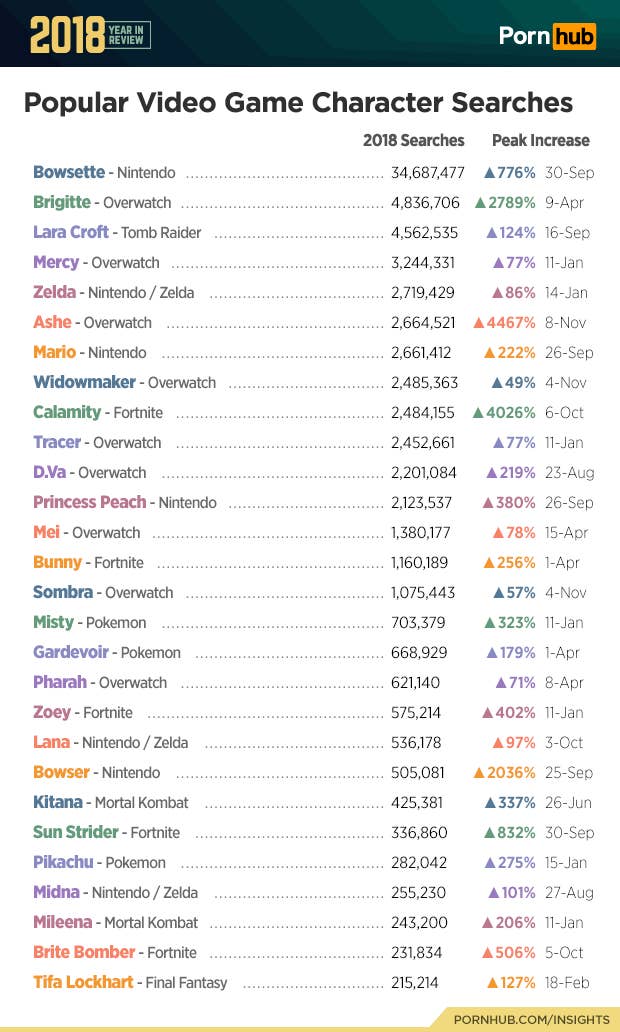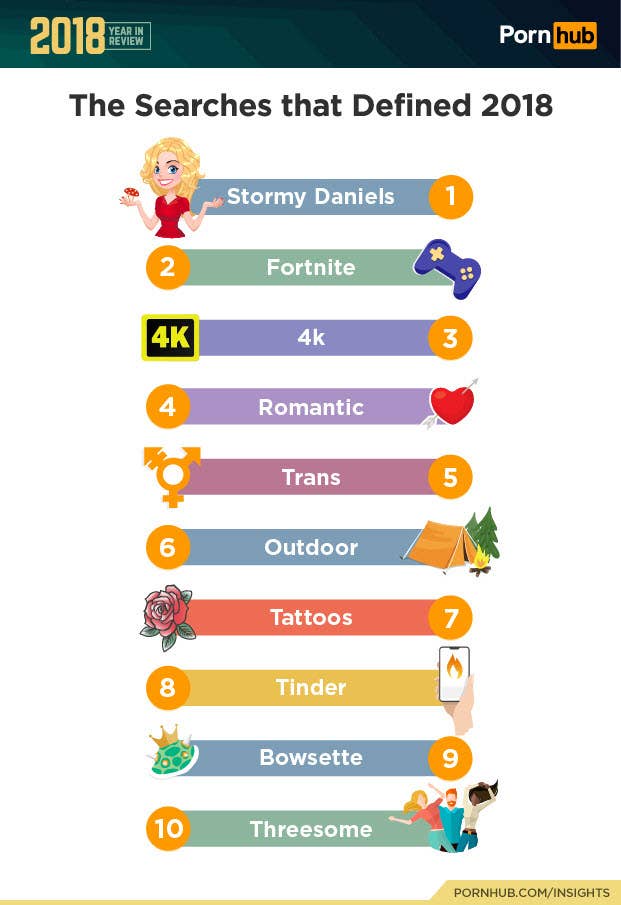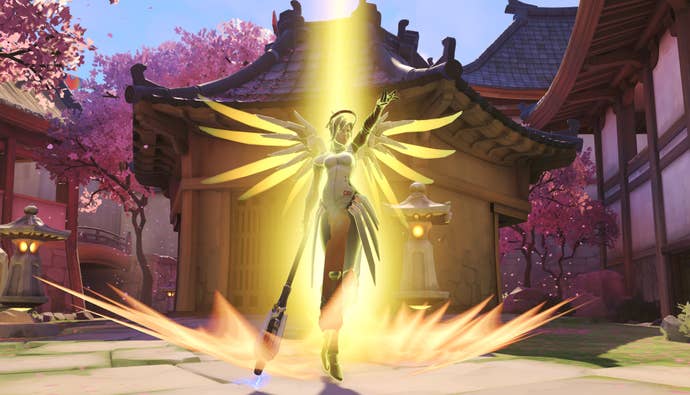Video Game Characters Keep Popping Up In Porn Ads, And Publishers Might Not Be Able To Stop It
We spoke with a lawyer, and more, about the shady world of porn ads and copyright law.
This article first appeared on USgamer, a partner publication of VG247. Some content, such as this article, has been migrated to VG247 for posterity after USgamer's closure - but it has not been edited or further vetted by the VG247 team.
In 2018, Pornhub exceeded 100 million daily hits. As the mammoth website put it in its own Year in Review for 2018, "that's as if the combined populations of Canada, Poland, and Australia all visited Pornhub every day." By the time the year wrapped up, the site had 33.5 billion total visits. Every minute, the site had nearly 58,000 searches.
Some of the most-popular searches last year included Epic Games' pop culture juggernaut Fortnite, Blizzard's hero shooter Overwatch, and the fan-created character Bowsette—who was searched for 34,687,477 times, more times than any other video game character by a very large margin. If you total up all of the most popular searches for video game characters on Pornhub last year, pornographic content featuring characters such as Princess Peach, Pikachu, and D.Va from Overwatch, among 25 others the site provided data for in its 2018 year in review, were searched for a total of 76,675,542 times.
In porn, video games are big business. And the industry is wasting no time capitalizing on that fact.
The internet's top adult tube sites, such as Pornhub, Redtube, and XVideos, are now littered with ads for pornographic games where players take control of the action, interacting with characters and engaging in explicit sexual situations. These ads often feature popular video game characters to sell their products, such as Ciri, Triss, and Yennefer from The Witcher series, Elizabeth from Bioshock Infinite, and the protagonists from the first Life Is Strange, Max and Chloe, all engaging in sexual activity of varying extremity in animated GIFs.

It's not entirely surprising, given how big video games are in terms of searches on porn sites, that popular characters would be used to sell a pornographic product targeted toward video game players. But it does raise some immediate questions: are video game publishers selling the rights to these companies for these ads? If not, is Square Enix aware 2B from Nier: Automata is featured performing fellatio in an ad on the web's top porn sites? This stuff is all blatant copyright infringement, right?
So, Is This All Copyright Infringement?
The answers to these questions are: no, maybe, and yes. Tube sites, third party advertising companies, and adult game developers are using licensed video game characters in ads to the tune of a lot of ad revenue, without getting the rights to said characters. Which, of course, is copyright infringement. To make sense of it all, I spoke to Michael Lee, a lawyer and founding partner for Lee Law PLLC, a firm focusing on "brand protection, intellectual property, and video games law."
"It's a big problem," Lee tells me over the phone. "So here we have work done by other people that's being exploited in a different way to sell a different product that's not authorized. So we have absolute copyright infringement. There are no arguments."
One of the most troubling things about these ads is how many feature characters from games or movies targeted toward children, such as the PG-rated film The Incredibles (which was searched for more than 7,000,000 times on Pornhub in 2018), and the Teen-rated games Fortnite and Overwatch—the former being Pornhub's top trending search last year.
It's naive to think that every person going to a porn site is of age. Children are seeing these ads just as often as adults are. The biggest difference being that children are far less discerning when clicking and buying something that might be deceptive or malicious—especially in the video game world. That, according to Lee, tarnishes the goodwill of a brand. And that's actionable.
"You're doing damage to the overall goodwill associated with [the brand]," Lee says. "And one of those arguments is, 'Hey, children that spend a lot of money on these characters don't want to see their heroes compromised.' And that's really the best argument that you have. Any argument that you have that damage is being done and children are being hurt is always very persuasive in a court of law, because [while] adults can make their own choices, children can't. So if you're doing something that harms children, there really is no way to protect them. So the people that do that should be punished more than the people who are taking advantage of adults."

While Pornhub obviously isn't going to have statistics on what children are looking at on its site, it might be possible to infer some information by looking at the most popular searches from its youngest age bracket. According to Pornhub, Fortnite, cartoon, anime, and hentai were amidst the top searches among people between the ages of 18 and 24.
"It's a simple argument but it's very persuasive, especially to judges," Lee says. "When you hear that adults are compromising the values of children and children's characters and benefiting off [it] greatly, absolutely it's something that should be considered when looking at things like damages and assessing liability."
Just how often is a user seeing these ads? Well, it depends on a few different variables. But I did some math to try and figure it out, going to three of the top tube sites in the world—Pornhub, XVideos, and xHamster—and counting just how often these ads pop up based on 50 refreshes of certain pages and searches. Since my search history would have a lot of video game-related searches that might affect results, I used incognito tabs in an effort to avoid any and all targeted ads. Here's how it breaks down:
- Pornhub's front page: 14 of 50 ads were video game related, with 11 of those featuring discernable licensed characters such as Mei from Overwatch and Elastigirl from The Incredibles.
- XVideos' front page: 25 of 50 ads were video game related, with only four of them featuring discernably licensed characters, such as D.Va (who pops up in a lot of these ads) and a character closely resembling Harry Potter.
- xHamster, at least at the time of writing, does not have ads on its front page, so I had to click a video at random for this test. Refreshing 50 times yielded 14 video game ads, with 10 of those having licensed characters, which were mainly just D.Va again. (It's worth pointing out that a video page on xHamster has two ads at the top of it directly beside the video player.)
So, trying to eliminate as many caveats as possible, a little over a third of ads a person might see when visiting a porn site's front page are video game ads, and one-sixth of those have noticeable licensed characters in them. One thing I noticed while refreshing xHamster's page was a lot of the ads seemed to be similar to the content of the video itself. So, staying under the incognito parameters, I decided to do a similar test across all three sites, but on the page for a video game porn video.
The result was an even larger increase of video game ads, including an official Pornhub banner ad advertising a free week of Pornhub premium for "Apex players," assumably meaning Apex Legends players, though no characters from the game were used in the ad and clicking it took me to a sign-up page with no further mention of the game. Suffice to say, tube sites are targeting people looking for video game porn with video game ads featuring known and popular characters.
It's a lot of numbers, but it highlights just how often these kinds of advertisements are reaching people. People who, Lee thinks, might not always know the difference between something officially sanctioned by a video game developer or publisher and something that's blatant copyright infringement.

Where These Ads Lead
None of this even touches on what you can see if you click one of these ads. In going to the adult game's actual website, you find numerous other licensed characters doing all manner of confusing things. A scene of Tinker Bell from Disney's classic children's film Peter Pan sticks out as particularly troubling.
"It's disturbing. And the reason why it's being done is obviously these ads are the most popular ones," Lee tells me. "It's classic clickbait, where somebody looks at it, gets interested, and says, 'Oh hey, that's my favorite character from The Witcher,' or something like that, and clicks on it immediately.
"Not everybody's a sophisticated user who would look at something and go, 'Oh come on, that's just somebody using somebody else's work.' People might go, 'Oh wait, this is sponsored by my favorite video game? Let me go ahead and buy this product because I'm such a fan of what they do.' And that's where you really get your infringement, where you get people confused in the marketplace."
Dr. Laurie Betito, director of the Pornhub Sexual Wellness Center—a safe-for-work site Pornhub launched in 2017 to promote sexual safety and education—spoke to the popularity of video game characters in porn in Pornhub's 2018 Year in Review, saying, "searches like these serve as an indication that people use [Pornhub] to not only satisfy sexual urges but also to get a different angle on something they are already interested in. To see a famous character or hot topic in a sexual context."
"Fantasy plays a big role in pornography (and indeed in human sexuality), so it's only natural that people will desire seeing sexual scenarios involving the game characters they emotionally connect with," Pornhub added in its year in review.
Pornhub outright acknowledges the popularity of video game characters in porn. Tube sites purposefully run ads confusing users into thinking they're buying something pornographic featuring their favorite video game characters. And yet, the sites' hands may be clean of this whole mess, but only to a point.
Pornhub, and many sites like it, employ services to fill their ad spaces for them. Enter TrafficJunky, owned by the same company as Pornhub, MindGeek. TrafficJunky is responsible for all the ads not only on Pornhub, but also other tube sites like Redtube, YouPorn, and Tube8. The service sells ad space using what it calls "cost-per-mile" advertising, which allows clients to set a campaign budget and price they'd like to pay, as well as choosing a target audience. From there TrafficJunky populates a site with its client's ads based on all the aforementioned parameters. According to the company's media kit, it gets 1.35 billion ad impressions a day in the United States alone.

Have an adult video game company with a fresh new ad featuring the game industry's hottest new character? Want it seen by millions on some of the internet's largest sites? TrafficJunky, or an equivalent service, is the way to go. Even if your "game" is a complete scam, as some interested visitors have found out, asking for credit card numbers, despite claiming to be a "free" game.
Because of these third-party services, tube sites aren't directly liable for the ads running on their front pages. But, according to Lee, that's not to say they don't have a say over what appears on their front page, especially if a copyright owner objects to its intellectual property sharing a homepage with hardcore pornography.
The use of copyrighted material for something like porn ads isn't technically illegal; you can't go to jail for it, Lee explains. The creators of these ads, however, could be sued for infringement to the tune of some pretty large amounts of money, depending on what kind of damages an intellectual property owner claims the ads caused. But before any of that can happen, by law, the offending party must be given the chance to right its wrongs with no financial or legal ramifications after being sent either a cease and desist letter or a DMCA takedown.
"So it's an easy situation where you send that letter and say 'Okay Pornhub, we're sending you a cease and desist.' So what do they do? They act and they tell their third party to [...] stop doing it. And they'll stop," Lee says. "The third party ads, and the ones that populate those third party ads, those are the ones who are really doing the conduct that's most of the time going to lead to liability. They are the ones creating the ads, they're the ones posting the ads, and they're the ones that know exactly what they're doing. They're the ones who could be held directly liable for copyright infringement.
"Sites like Pornhub are complicit, probably, in what goes on, but the law requires that they be put on specific notice of what's going on and that they take action. Much like if you go to eBay and eBay is selling some product that they shouldn't be but they don't know about it, you're required to put them on notice of it. And if they don't take action, that's when they can be held liable."
When reached for comment, Pornhub deferred to TrafficJunky. After Pornhub requested a list of questions, it answered nothing I sent over, rather its vice president Corey Price simply said, "Anyone that notices potential issues or has concerns with ads they see on the site should contact TrafficJunky at support@trafficjunky.com."

Which, of course, I did, but didn't hear back. When I contacted them again about a specific person we could reach out to at TrafficJunky, Pornhub didn't reply. Nor did it respond when followed up with about whether or not it would like to address the previous questions we sent over. Pornhub's parent company MindGeek said it would have TrafficJunky reach out to me directly, but I never heard from the site.
According to Lee, it's safe to assume these types of notices are being sent out quite a bit—he brings up a few non-specific examples of having to do it himself in the past. Once that notice has been sent, if the offending image is taken down, no lawsuit is necessary. This is ostensibly why we haven't seen anything about lawsuits in the news regarding this kind of copyright infringement, in regards to porn sites' ads. In 2016, creators of Overwatch porn did report receiving DMCA notices from developer-publisher Blizzard, pointing to a precedent for publishers taking action against this type of material.
In fact, while reporting on this story, the brand manager for Life Is Strange at publisher Square Enix's external studios told us they'd contacted Square's legal team to issue a takedown after being requested for comment about the use of protagonists Max and Chloe in an ad on Pornhub. Though, they say, they didn't think anyone from either Square or developer Dontnod Entertainment knew about the ad. They declined to provide an official comment on the ad and whether or not it negatively affected the Life Is Strange brand.
Other developers and publishers, such as CD Projekt Red, also declined to comment on the use of their characters in these ads. Others didn't respond to our comment request in time for publishing, as was the case with Activision Blizzard.
The Ads Are Stealing From More Than Just IP Holders
One of the only replies I was able to get was from an adult animator going by the username FUGTRUP, who's seen a lot of their work stolen for these ads. The GIFs featured on tube sites promoting adult video games, more often than not, are taken from independent creators like FUGTRUP, who make pornographic images and animations of popular video game characters. Since they too are using licensed characters without permission, these independent creators are also infringers. But since they own the rights to their art, infringement or not, technically the ads are an infringement on an infringement, and the animator could go after the ad makers.
"But, being practical, this rarely ever happens because the fan artist is calling attention to its own infringement and could then find itself being sued by the original copyright holder," Lee says.

FUGTRUP says they've never been asked for permission by any of these sites to use their work, despite seeing it numerous times on porn sites. Though, they don't have any intention of going after the ad makers for different reasons than Lee's example.
"Firstly, because I am not sure I have any authority to make them remove [the ads], and secondly, honestly, I don't care," they tell me over direct message. "I don't condone 'stealing' my work for monetary purposes, but it doesn't hurt me in any way, and even, hopefully, could bring more attention to my work.
"My patrons support me not for stealing others's [sic] intellectual property, they support me because they like my work," FUGTRUP says, referencing their Patreon, which, as of writing, brings in $696 monthly from 262 patrons. "It's just a fan art and I'm not selling anything. These 'ad companies,' on the other hand, use artworks without permission to lure people to their shady monetary schemes and non-existing 'sex games,' or worse. I personally see the difference quite clear."
If a DMCA or cease and desist were to be sent, once an ad is taken down, Lee tells me, it's likely that it'll just be replaced by another one. Neither letter serves as a catch-all. Besides, there's too much money to be made by tube sites, their third party ad services, and the companies making the ads to simply stop using licensed characters. "There's nothing but revenue that's being shared among many parties," Lee says.
"Is there this general overall knowledge of infringement that's going on on the websites? Absolutely," Lee adds. "There's no way that the people that create these websites—like Pornhub—don't know that third party advertisers are using their space to infringe other people's intellectual property." But, he continues, it's a risk-reward scenario, where the offending sites are making a lot of revenue off other's intellectual properties that the risk of getting a cease and desist are worth it. Or, per Lee's example, they might think "'Well, you know, what are the chances that anybody at Riot actually ever sees this infringement going on anyway?'"
Which leaves the whole situation in a "what if" scenario. Will video game publishers decide to take these companies to court? It could happen, but it doesn't necessarily mean it'll solve the problem. It's a "whack-a-mole" situation, as Lee puts it, where these companies have numerous infringement issues to deal with and can't take every single one to task.
If it were to happen though, we might see some hefty lawsuits thrown in the direction of the offending parties.
In copyright law, Lee explains, damages are assessed two different ways: actual and statutory damages. The former being how much money the infringing content made, how much the IP owner lost, how much profit it generated, how many times the ad was clicked on, things like that. If a company made a million dollars off its infringed work, per Lee's example, the IP owner could ask for that amount back in a suit. The latter comes into play when actual damages are hard to accurately determine. According to Lee, statutory damages can be claimed at up to $150,000 per work. Attorney fees could also be requested with statutory damages.

"Especially with things like this, there's not a way to assert damages to somebody's brand and good will," Lee says. "But there is a way to assert damages based on how many clicks it got, how much revenue it generated. So yeah, the damages could be huge in cases like this. It really depends on how much revenue was generated."
Time will tell if video game publishers start taking tube sites to court. According to Lee, the tube sites would "absolutely" be found liable if a cease and desist or DMCA is ignored, and publishers could stand to win some big money from the infringement of their characters. But on the other hand, it's hard to say one successful lawsuit will eradicate the entire issue. It could be that taking Pornhub or another site to court just isn't worth the time, effort, or money needed for a publisher with plenty else on its plate.
"It's hard for a copyright owner to shut down every infringement," Lee says. "There's some that you have to go after, and then there's some that fall through the cracks. [...] But I think if a situation does arise one day where it does get to the table of somebody in charge who's really upset about it, then I think you'll start seeing legal action."
